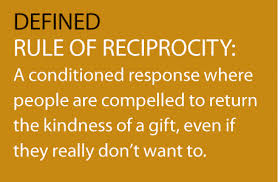 Just the other day, I found myself in a boardroom facilitating a training on how to make a textbook-perfect, face-to-face solicitation. Discussion topics focused on all the usual suspects including fears, begging, best practices for getting on someone’s calendar, the 12-step process for making the actual ask, etc etc etc. However, at the end of the training and facilitated discussion, one board volunteer asked the following question:
Just the other day, I found myself in a boardroom facilitating a training on how to make a textbook-perfect, face-to-face solicitation. Discussion topics focused on all the usual suspects including fears, begging, best practices for getting on someone’s calendar, the 12-step process for making the actual ask, etc etc etc. However, at the end of the training and facilitated discussion, one board volunteer asked the following question:
“If you ask friends to contribute to this organization, then how can you stop them from coming back and asking for reciprocity for their favorite charities?“
I get this question all of the time, but I’ve never blogged about it. So, I thought I’d tackle this issue today by providing a few simple solicitation tips/tricks/suggestions that I’ve seen work.
Stop worrying about it!!!!
Does “quid pro quo solicitation” occur? Sure it does. Does it happen often? Well, it depends on how you solicit other people. However, it doesn’t happen nearly as often as you think it does. This is a classic example of how fear manifests itself and makes things seem bigger than what they actually are.
I titled this section “Stop worrying about it” because control is an illusion. There is nothing you can do that will stop your friends from doing anything in this world, which includes asking you to make a pledge, buy some cookies or volunteer a little time.
This is a mindset issue, which is why I encourage you to start with changing how you look at this.
Of course, there are other things you can do to minimize how often you get asked for charitable reciprocity. So, please keep reading . . .
Stop asking for “favors”
 Over the years, I’ve heard volunteers say all of the following things when trying to fundraise:
Over the years, I’ve heard volunteers say all of the following things when trying to fundraise:
- “Hey, I need a favor. Can you find some time in your busy calendar to sit down with me to talk about [insert name of organization and their fundraising activity]“
- “Thanks for agreeing to sit down with me. You know I wouldn’t be here asking for a contribution if I wasn’t an expectation for board members to do fundraising. I would consider it a favor if you’d make a pledge to support [insert name of organization and their fundraising activity]. Anything you can do would be appreciated.”
- “Do you remember the time when you asked me to make a pledge to [insert name of organization and their fundraising activity]? I need to call in that favor because I’m raising money for [insert name of organization and their fundraising activity].”
If you stop asking for “favors” during the solicitation process, the number of “return favor” requests will go down. It really is that simple.
Don’t beg for money. Frame your ask as a social investment in the community.
Make your passions known
When soliciting friends to make a contribution to your favorite non-profit organization, make sure to share your commitment and passion right before making the official ask for support. It might sound something like this:
- “As you know, my non-profit passions are 100% all about [insert name of organization and their fundraising activity], which is why much of our household’s charitable giving is dedicated to this organization. I wouldn’t be asking for your consideration today if I wasn’t all in.”
- “I believe so strongly in [insert name of organization and their fundraising activity] that this is only one of a very small number of charities we support and focus our philanthropy on. We wouldn’t be asking other people to invest if it wasn’t something we believed strongly in.“
Sharing your commitment during the solicitation call does two important things from a psychological perspective:
- It is a reminder to yourself that you’re personally invested and not begging for money and definitely not asking for favors
- It is a direct message to the person you’re soliciting that your philanthropic priorities are set, which is a subtle message about what you may or may not consider in the future if they choose to solicit you on behalf of other charities
Be prepared to say NO
Saying NO is a difficult thing for most people. It usually comes with a number of fears. However, if you are afraid of friends coming back to you to leverage their contribution to your favorite organization for your contribution to their favorite organization, then you need to start practicing the art of saying NO.
Of course, the challenge is saying NO the right way.
The following are key messages you’ll deliver during that quid pro quo solicitation call with your friend:
- You’ll remind them of what you said during your solicitation visit with them about your philanthropic portfolio (e.g. priorities, preferences and household charitable giving budget)
- You’ll remind them that you asked them to support your charity of choice because you felt like it was a good fit with their philanthropic passions.
- You’ll gently tell them that you didn’t ask them for “a favor,” but rather offered them an opportunity to invest in a great organization with a great mission and community impact.
- You’ll appreciate them for their passion for their organization. You’ll ask them to share their stories and ask questions along the way.
- If you end up saying NO to a financial contribution to your friend’s charity of choice, hopefully you’re willing/able to engage in a brainstorming session about who else in your shared social circle might be willing to consider involvement or financial contribution.
Saying NO involves an explanation, compassion, and gentleness; but it isn’t as hard as you think. While this might sound silly, I suggest practicing this conversation in the mirror or in your head in order to become comfortable. If you need more advice on saying NO, I suggest clicking through to Alexandra Franzen’s blog post — How to Say No to Anyone (Even a Good Friend).
Have you had experience with charitable reciprocity and your friends? How have you dealt with it? Please us the comment box to share your experiences, thoughts and practices. We can all learn from each other.
Here’s to your health!
Erik Anderson
Founder & President, The Healthy Non-Profit LLC
www.thehealthynonprofit.com
erik@thehealthynonprofit.com
http://twitter.com/#!/eanderson847
http://www.facebook.com/eanderson847
http://www.linkedin.com/in/erikanderson847
